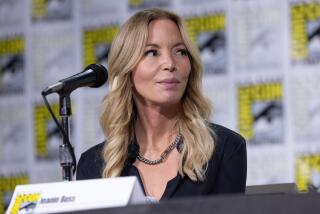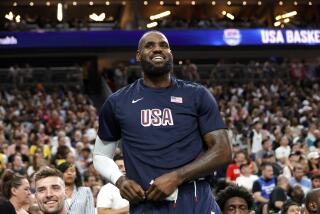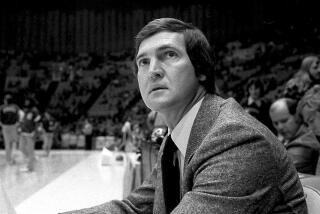THE NBA: 1994-95 PREVIEW : A Revival Would Be Healing, Timely
- Share via
Another opening, another show, thankfully.
Beset by problems as it left the stage last June to the yawns of a bored nation, so scorned that a preseason yearbook ran a cover asking “Is the NBA Dead?” it returns on Friday to the gratitude of sports-starved Americans.
Who would have thought all it had to do to reclaim its cachet as “the league that works” was play a game?
But with work stoppages in baseball and hockey, fans have learned to appreciate a game whose players and administrators can work out their problems on their own time. The NBA and its players are working without a contract but with a no-strike, no-lockout pledge that makes it impossible for either side to pull the plug without making itself look like “The Grinch That Stole Christmas” and a liar, to boot.
Despite everything that went wrong last season--no Michael Jordan, bratty stars, a game that looked more like mud wrestling than ballet--the NBA had solid fundamentals that allowed it to avoid the pitfalls that felled baseball and hockey.
The NBA had undisputed and widespread prosperity, unlike baseball and hockey.
NBA owners long ago accepted the legitimacy of the union, unlike baseball, whose owners took strike after strike, trying to break the players’ association.
The NBA did not have a commissioner who got the job by promising the owners a salary cap, unlike the NHL.
Instead, NBA Commissioner David Stern was bent on avoiding the league’s first work stoppage. The NBA opened its books to the union, unlike the NHL, which offered to furnish only selected data.
The NBA had players who had grown rich under a salary cap and weren’t the least bit interested in a work stoppage, unlike baseball and hockey.
A hard negotiation lies ahead, however. Stern and the former union head, Larry Fleisher, would engage in marathon screaming matches but they were a couple of New York guys who understood each other, so for them, bellowing was an expression of endearment.
The new union head, Wharton-trained Charles Grantham, is less trusting, more of the opinion that the league was playing him for a punk. Soon after he took over, a court fight produced records showing the NBA had been hiding luxury-box revenue from the players. The league was obliged to make a huge cash settlement.
Further, Grantham notes that players’ gains, although significant, are nothing compared to those of the owners. The Lakers’ Jerry Buss, for example, bought his team, the Kings and the Forum for $67.5 million in 1980. When Magic Johnson bought in last summer, he assumed a franchise value for the Lakers of more than $200 million, an annual rate of appreciation of more than 25%.
But NBA owners still have their system, the games will go on, there are new rule changes designed to open play and everyone is happy, for the moment.
*
A comer on the American scene since it began its rise from YMCA dance-floor status, the NBA has taken its share of falls.
Billed as “the game of the ‘70s” after Madison Avenue’s beloved Knicks had won their first title, the NBA was instead beset by all manner of problems--a rival league, drug rumors--and limped into the ‘80s.
The Magic Johnson-Larry Bird rivalry turned the ‘80s into a golden age with engaging superstars who had the pretensions of a ballboy, preparing the stage for the greatest star the game had ever known, Jordan.
In the shrinking TV market of the late ‘80s and ‘90s, the NBA posted impressive gains. The Dream Team took over the 1992 Olympics. The 1993 NBA finals, with Jordan’s Chicago Bulls and Charles Barkley’s Phoenix Suns, drew higher ratings than the World Series for the first time.
The idea arose that the NBA was “bulletproof” but the 1993-94 season put a hole the size of a .357 magnum slug in that theory.
Jordan retired. Two unspectacular defensive clubs, the Knicks and Houston Rockets, turned the finals into an entertainment debacle that had even basketball fans reeling from their TV sets. Golden State Coach Don Nelson said he turned it off and went to play golf. Ratings plummeted from the previous spring’s record 17.9 to 12.3, the league’s worst since 1981.
Worse, NBA stars turned a new, immature face to the public.
The league’s accession had been personality-driven, Julius Erving & Co. passing the torch to Johnson and Bird. By the ‘90s, no one wanted to keep a flame that suggested obligation more than reward.
Johnson said he’d pass it to Jordan, who said he didn’t want it. No one has seen it lately. Maybe it’s in Jordan’s baseball locker in the Arizona Instructional League.
“The flame,” says Johnson, laughing, “is out.”
Players now arrive in the NBA rich, famous and jaded, having become celebrities in the NCAA tournament, still basketball’s highest-rated event. They sign million-dollar deals with sneaker companies eager for new spokesmen to replace Jordan, Johnson and Bird. They are given ridiculous salary deals, like Larry Johnson’s $84-million extension, which prompted Derrick Coleman to sneer publicly at the Nets’ $69-million offer--he handed out T-shirts mocking the proposal--and persuaded Glenn Robinson’s agent, Charles Tucker, to seek $100 million before his client had scored his first professional basket.
Young stars once had a few years to grow up before becoming spokesmen but a new generation has been thrust upon us, barely out of its teens.
Last summer’s World Championships was supposed to be a coming-out party for the NBA’s young stars but they behaved more like Hell’s Angels at an embassy tea.
The so-called “Dream Team II” repeatedly tried to humiliate overmatched opponents, demonstrating only how much things had changed and offending everyone.
“You already know you’re better and you’re going to prove that playing but that’s the new thing so we all have to get used to it,” says Magic Johnson.
“This is the thing of, ‘I want to dunk and I want to let you know I dunked in your face so I’m going to sit here and growl and throw my hands up and look at you for 20 seconds.’
“In our day, when a guy did something like that, they would let him drive to the hole the next time and put him on his butt. No question about it. It was the unwritten rule. You just didn’t show anybody up. Now you could say ‘I got you!’ or something--and keep going. Like Larry and Coop (Michael Cooper) had a little thing but they kept playing. You never saw Larry Bird make a jumper and point at Coop’s face. Coop would have ate his finger off. . . .
“Larry backed up his talk. They got guys now--I’m watching some playoff game, some dude who doesn’t even play that much, he’s talking! See, when I played, great ballplayers talked ‘cause they could back it up.
“But it’s changed and I don’t like it. Now people around the world don’t like it. I traveled around the world after this happened, on my tour, and everybody was saying the same thing. They say (Dream Team II players) didn’t have the class we had. We were in Spain and the Spanish writers were all talking about it. One of them said, ‘We as writers, as fans, we cheered for you guys even when you played our team. But not this team.’
“He said the players hated them, the fans hated them. It’s too bad. They (U.S. players) don’t understand. It’s this cool thing. It’s just crazy now.”
Perhaps the NBA only needed time to make the transition.
Shaquille O’Neal, the young star of stars, seems to be settling into his role. He actually talked before an exhibition game here, something he had avoided for his first two seasons.
Chris Webber is a handsome, engaging young man who can play. In his first exhibition season, Grant Hill looked so talented and gracious, a Detroit writer wrote, “Grant Hill is a god.”
A new day beckons, hopefully.
* WESTERN CONFERENCE: Preview. C6
More to Read
Go beyond the scoreboard
Get the latest on L.A.'s teams in the daily Sports Report newsletter.
You may occasionally receive promotional content from the Los Angeles Times.










